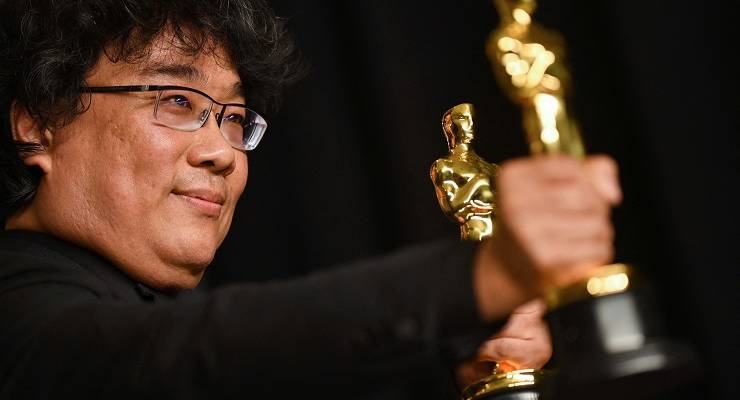
It felt, finally, like a game-changing moment; the year that the Oscars so desperately needed.
Yep, Brad Pitt finally won his first Oscar as an actor, breaking a 33-year drought.
I’m sorry, I should be treating the 92nd Academy Awards with more reverence. And indeed, history was made.
Thankfully, South Korean comedy thriller Parasite deserved all the plaudits, including its awards for best original screenplay, best international film, best director and best picture. It was the first film not in English to take home the Academy’s top prize.
It’s an engrossing story about rich and poor and family and class, a biting social satire about human foibles and quite unlike any other.
Parasite won on merit, even if the Academy hoped the first man to win four Oscars in a single ceremony since Walt Disney himself would rebalance the lack of diversity among all the other nominees.
As usually seems to be the case with the Oscars, those watching from home may have been hoping the wins would rebalance America itself.
The opening song and dance number, starring diversity champion Janelle Monae and dancing Nazis, divided critical opinion.
Former hosts Steve Martin and Chris Rock kept the introductory gags sharp, while two women who should have hosted — Maya Rudolph and Kristen Wiig — were delightfully offbeat.
Even Rebel Wilson and James Cordon came through, doubling down on the disaster that was Cats in their feline costumes. And special mention to the unique hip hop recap by Pitch Perfect actor Utkarsh Ambudkar.
But Hollywood doesn’t really do stars nowadays. It does messaging.
For a long time political attitudes, specifically diversity, trumps artistic merit as the lens through which all Oscar wins must be viewed.
So much so that best actress winner Renee Zellweger’s desire to focus on her work, and her statement about Judy Garland as a “hero that united and defined us”, seemed quaint and naïve.
For many, the nadir (or apogee) of the speeches this year was Joaquin Phoenix, who won for his portrayal of the Joker in a decidedly un-PC film.
Apologies again, but since Ricky Gervais’ roasting of hypocritical celebrities at the Golden Globes, telling them they were in “no position to lecture the public about anything, you know nothing about the real world”, I can’t be sincere about lectures delivered by the 0.01%.
“Many of us are guilty of an egocentric world view, and we believe that we’re the centre of the universe,” Phoenix said.
For a split second I thought Phoenix would rail against actorly self-indulgence. But then he told his audience to be nice to cows.
The best speeches were from the winners of the best documentary awards — American Factory and Learning to Skateboard in a Warzone (If You’re a Girl) — delivering passion and sincerity rather than self-indulgence.
A true star does more than make a speech.
Marlon Brando refused to attend the Oscars in 1973 when he won best actor for The Godfather. Instead he sent activist Sacheen Littlefeather to explain it was because of the industry’s depiction and treatment of Native Americans.
That extraordinary speech, delivered with grace and sincerity, feels a world away from today’s Oscar lectures.
Contemporary Hollywood can complain all it likes. Yet they still turn up.
It’s far too early to know if 2020 and the wins by Parasite‘s Bong Joon-ho really are a “game changer”.
Remember, 2002 saw another game changer when black actors Denzel Washington and Halle Berry won the best acting awards. The ceremony was hosted by Whoopi Goldberg.
But Goldberg is the only black woman to host the show, and since that year, a grand total of two black men have won best actor, and zero black women best actress.
And this year while the ceremony was a kaleidoscope of racial and gender diversity, the key nominations were still overwhelmingly white and male.
But then so is the Academy. And so is the film industry.
This year’s ceremony also put aside time honour the passing of Issur Danielovitch, the 103-year-old star we came to know as Kirk Douglas, the last survivor of Hollywood’s Golden Age.
Douglas starred in many films, including Spartacus in 1960. It was at his and others’ insistence that Dalton Trumbo be credited as the film’s screenwriter, helping bring about the collapse of the blacklist against employing communists.
Game changer indeed.








Perhaps the change they need is to get back to the reality that this is an industry event primarily to celebrate and promote itself. If individual members wish to promote themselves and their causes that’s a wonderful thing but do it at their own events under their own steam.
The public have conclusively shown they want escapist glitter from Hollywood with ever less regard for acting talent, quality writing or social causes.
The message I get is that Hollywood understands this and has directed those who want quality to look to foreign shores.
The Oscars are usually just US marketing glam to self stroke overrated and obscenely aloof hams. Really a celebration of the death of foreign movie industries.
The winning South Korean movie, enthralling at first, ultimately flipped in to the tiresome routine Korean movie formula of overwhelming revenge, bloody murderous deaths and destruction. This movie is Hollywood itself on display.